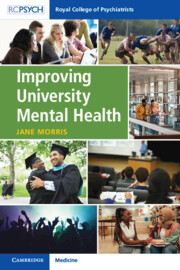Book contents
- Improving University Mental Health
- Improving University Mental Health
- Copyright page
- Contents
- Foreword
- Acknowledgements and Thanks to Contributors
- Chapter 1 Introducing This Handbook
- Chapter 2 Building a New Sense of Belonging
- Chapter 3 The Transition to University for New Students with Pre-Existing Mental Conditions
- Chapter 4 The Roles of Parents and Carers
- Chapter 5 Healthy Bodies, Body Image Concerns, Eating Disorders
- Chapter 6 Alcohol
- Chapter 7 Substance Misuse
- Chapter 8 Social (and Anti-social) Media
- Chapter 9 Finance and Mental Health
- Chapter 10 Neurodiversity
- Chapter 11 Ethnically Diverse University Communities
- Chapter 12 Sexual Behaviour and Gender Identity in Universities
- Chapter 13 The Mental Health of Teaching and Academic Staff
- Chapter 14 An Overview of Mental Disorders in Students and Staff
- Chapter 15 ‘Psychotic’ Disorders
- Chapter 16 Mood Disorders
- Chapter 17 Suicide at University
- Chapter 18 Mental Health Services on Campus and in the NHS
- Chapter 19 Students of the Professions and ‘Fitness to Practise’ Issues
- Chapter 20 Summing It All Up
- Index
- References
Chapter 3 - The Transition to University for New Students with Pre-Existing Mental Conditions
Published online by Cambridge University Press: 08 February 2024
- Improving University Mental Health
- Improving University Mental Health
- Copyright page
- Contents
- Foreword
- Acknowledgements and Thanks to Contributors
- Chapter 1 Introducing This Handbook
- Chapter 2 Building a New Sense of Belonging
- Chapter 3 The Transition to University for New Students with Pre-Existing Mental Conditions
- Chapter 4 The Roles of Parents and Carers
- Chapter 5 Healthy Bodies, Body Image Concerns, Eating Disorders
- Chapter 6 Alcohol
- Chapter 7 Substance Misuse
- Chapter 8 Social (and Anti-social) Media
- Chapter 9 Finance and Mental Health
- Chapter 10 Neurodiversity
- Chapter 11 Ethnically Diverse University Communities
- Chapter 12 Sexual Behaviour and Gender Identity in Universities
- Chapter 13 The Mental Health of Teaching and Academic Staff
- Chapter 14 An Overview of Mental Disorders in Students and Staff
- Chapter 15 ‘Psychotic’ Disorders
- Chapter 16 Mood Disorders
- Chapter 17 Suicide at University
- Chapter 18 Mental Health Services on Campus and in the NHS
- Chapter 19 Students of the Professions and ‘Fitness to Practise’ Issues
- Chapter 20 Summing It All Up
- Index
- References
Summary
This chapter follows on from the previous chapter, now focussing on challenges of transition to university for students already diagnosed with a mental illness. It examines the pros and cons of different options in this situation, highlighting the time involved in negotiating health service transfers. Financial and geographical organisation of health services result in dangerous gaps in treatment and support. Academic studies can be therapeutic and contribute to recovery and self-esteem but high levels of competitiveness threaten success and mental well-being. Wellbeing and pastoral support are important factors in choice of a university for people with pre-existing mental illness. Mental illness can delay the adolescent maturational process. Formal mentoring into and during university life can be particularly helpful for those vulnerable to mental illness. Transitions occurring further on in university life also require careful management. Staff and students with mental disorders who need periods of sick leave should be supported both to leave academia and to return later on. If a return is not possible, as well as at the end of a course or contract, there is a potentially high risk gap where university services are no longer accessible.
Keywords
- Type
- Chapter
- Information
- Improving University Mental Health , pp. 21 - 32Publisher: Cambridge University PressPrint publication year: 2024



